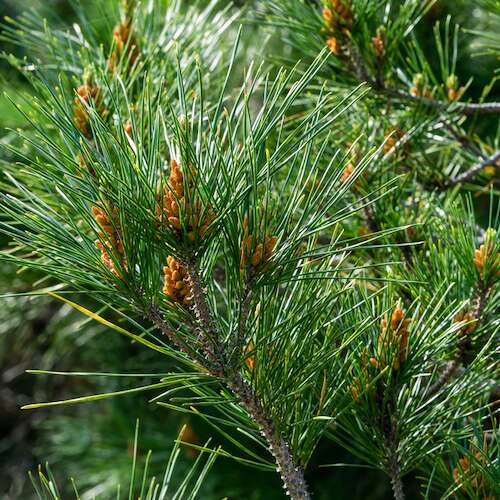The Astounding Benefits of Pine Needle Tea
Posted on October 12 2021
Have you heard about pine needle tea? There's a lot of discussion online currently about it's medicinal qualities and the possibility that it can boost the immune system and help with cold and flu viruses. What I found out is that it can do a lot more than that!
To find out how to make pine needle tea and which pine needles to look for click here.
Pine needle tea can help as an expectorant for coughs and relieving chest congestion, it also has a soothing effect on sore throats. Pine needles contain potent antioxidants which reduce free radicals in the body which harmful to humans and can cause disease.
Pine needles have a high level of vitamin A which supports healthy eyesight, hair and skin and also improves red blood cell production and are rich in vitamin c which helps to fight illness, infections and conditions such as heart disease, skin complaints and fatigue.
One of the most impressive facts about pine needles is that they contain 4-5 times more vitamin C than orange juice! High doses of vitamin C help to stimulate the production of white blood cells and promotes antioxidant activity throughout the body which helps to speed healing, lower your risk of chronic disease and improve collagen production.
"Ingesting vitamin C is vital to humans as our cells cannot perform the crucial last step of vitamin C biosynthesis, the conversion of l-gulono-g-lactone into ascorbic acid, which is catalysed by the enzyme gulonolactone oxidase."
Find out more about the synthesising of vitamin C in humans here.
Another very impressive fact is that the needles also contain suramin and shikimic acid.
Suramin helps ease blood coagulation, excessive coagulation causes blood clots, mini-clots, strokes, and unusually heavy menstrual cycles. Shikimic acid is the basis for Tamiflu, and it’s the molecule found in Chinese Medicine herb Star Anise.
Shikimic Acid
"Researchers at the University of Maine at Orono say they’ve found a new and relatively easy way to extract shikimic acid — a key ingredient in the drug Tamiflu — from pine tree needles.
Shikimic acid can be removed from the needles of white pine, red pine and other conifer trees simply by boiling the needles in water", says chemistry professor Ray Fort Jr.
"But the extracted acid could be valuable because Tamiflu is the world’s most widely used antiviral drug for treating swine flu, bird flu and seasonal influenza."
Suramin
Pine needles are the best natural source of suramin.
"Suramin is particularly helpful for blood clots, protecting your DNA and RNA, while antioxidants, also found in pine needles, help protect your heart, brain, liver, and other organs."
You can also buy suarmin as a tincture here.
And this article looks at the antioxidant, antimutagenic, and antitumor effects of pine needles in relation to cancer.
For more information on suramin click this link.
In 2011 a Korean study looked at the effectiveness of pine needle tea and demonstrated that this was the best way to access the antioxidant benefits.
The study demonstrated that the hot water extract of pine needle proanthocyanidins and catechins offer the highest levels of antioxidant benefits compared with chemical extract processes.
And finally there is this information from Joybileefarm.com.
These are the benefits that New Zealand Pine Needles (Pseudotsuga menziesii
Analgesic, antibacterial, antifungal, anti-inflammatory, antimicrobial, antioxidant, antiseptic, antitumor, antitussive, antiviral, aromatic, astringent, decongestant, detoxifying, disinfectant, diuretic, expectorant, immuno-modulating, improves circulation, lymphatic, relaxing, relieves nervous exhaustion and fatigue, relieves sore muscles, restorative.
Pine needles have been used by indigenous populations around the world as a medicine for hundreds of years and I also read that Taoist priests drank pine needle tea as they believed it made them live longer.
After researching for this article pine needle tea sounds truly miraculous. I am definitely including this tea in my natural healing arsenal along with other key vitamins, minerals, cell salts, oils, teas and tonics, many of which you can find in the various blogs on our website.
A more modern use for Pine Needle tincture is that it can prevent the damage of spike proteins in the unvaccinated when they are in contact with Covid 19 vaccinated people.
To find out how to make pine needle tea and which pine needles to look for click here.
To purchase ready made pine needle tea click here.


